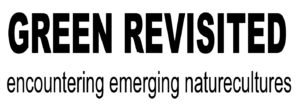4th Renewable Futures Conference
Thank you to everyone who participated in the 4th Renewable Futures Conference!
about
The Renewable Futures Network was established in 2008 and strives to facilitate new contact zones between traditionally separated domains – art and science, academic research and independent creative practices, sustainable businesses and social engagement.
The 4th Renewable Futures Conference questions how we experience and express life and the sense of aliveness today. Actualized by our current global pandemic, we invite artistic, academic or applied research perspectives on relations and intersections between human beings, living environments and machines. This might evoke a sense of the uncanny and a fear of domination and surveillance. It might also reveal a world of possibilities of becoming, creation of new forms and behaviors. Could we co-create a more balanced existence? Can we enhance our senses and communication to become beings that are more adapted to co-existence with our environments and other species?
The interdisciplinary artistic research project FeLT (Futures of Living Technologies) hosts the conference in conjunction with the Creative Europe project GREEN (Green Revisited: Encountering Emerging Naturecultures).
The 4th Renewable Futures Conference is curated to four thematic tracks:
Against the grain of the metaphorical overall ‘greening’ of activities, be it in commerce, the arts or academia, the notion of ‘prismatic ecology’ has emerged to rebuke the colour green and its cultural construction. How can new discourses overcome binary ideas of the other-than-human world as an idealized nature? While greenness as a superficial metaphor needs to be disentangled from terms— both putatively non-technological—such as ‘life’ and ‘nature’, how do artists and designers use and question technologies beyond anthropocentrism within a larger biosemiotic web ? How can media help to interact with ecologies understood as a shared ‘oikos’ (household) beyond anthropocentric ethics interested in ‘our’ environment only as a beneficial milieu for humans?
Practices of communication and co-creation with living organisms – such as microorganisms, plants or animals – might involve working with technologically complex systems as well as agriculture or indigenous knowledges and traditions. To rethink interspecies relations in the framework of a climate emergency moment can be a way to form entangled multispecies alliances
By the term living technology we think of the complex structures and functions of living organisms which have entered the hybrid and synthetic technologies. By including critical perspectives on the merging of technology and areas involving emotions, sensing and empathy, we question possible and speculative convergences of machine technology, artificial life, artificial intelligence and human bodies. We invite perspectives on the implications of future integration and communication between the machine and the living as well as speculative or applied.
Sensorium – how we experience, interpret, develop applied aesthetics today in order to reconnect with the environment, expanding the senses technologically inside and outside of institutions. Technologies continously provide new ways of filtering our experiences and different means of relating to the living environment. Aesthetics today are also affected by perceptual complexity, relating to experiences that transcend art and include a vast array of both natural and constructed environments. Human perceptions and sensory modalities are influenced and affected by the way we interact with our digital tools, and their presence is becoming characteristically transparent. Can the sensorium as an expanded aesthetics provide new modalities for connecting with natural resources? What new opportunities exist for interaction and how do technologies extend and provide explorative possibilities within sensations ? And, in what way do institutions understand and relate to this sensory complexity as a sustainable choice?
The 4th Renewable Futures conference will provide different formats for artistic interventions, discussion and exchange. The outcome will be a publication in the Renewable Futures series of Acoustic Space, as well as a curated screening program.
The Renewable Futures Network was established in 2008 and strives to facilitate new contact zones between traditionally separated domains – art and science, academic research and independent creative practices, sustainable businesses and social engagement.
The 4th Renewable Futures Conference questions how we experience and express life and the sense of aliveness today. Actualized by our current global pandemic, we invite artistic, academic or applied research perspectives on relations and intersections between human beings, living environments and machines. This might evoke a sense of the uncanny and a fear of domination and surveillance. It might also reveal a world of possibilities of becoming, creation of new forms and behaviors. Could we co-create a more balanced existence? Can we enhance our senses and communication to become beings that are more adapted to co-existence with our environments and other species?
The interdisciplinary artistic research project FeLT (Futures of Living Technologies) hosts the conference in conjunction with the Creative Europe project GREEN (Green Revisited: Encountering Emerging Naturecultures).
Conference language:
English
Conference venues:
Online (Zoom)
Conference fee:
The conference is free of charge but participants must register by date
Support and Partners:
4th Renewable Futures FeLT Conference project is supported by the EU program Creative Europe, Norwegian Artistic Research Program and OsloMet-Oslo Metropolitan University
Program committee:
Chair:
Kristin Bergaust, Professor of Contemporary Art OsloMet – Oslo Metropolitan University NO
Boel Christensen-Scheel Professor of Art Theory OsloMet – Oslo Metropolitan University NO
Jens Hauser, Researcher Medical Museion, University of Copenhagen DK
Stefano Nichele, Associate professor of ICT OsloMet – Oslo Metropolitan University NO
Rasa Smite, Professor and founding member of RIXC
Hege Tapio, PhD fellow FeLT Futures of Living Technologies OsloMet – Oslo Metropolitan University NO
Mikkel Wettre, Professor of Visual Art OsloMet – Oslo Metropolitan University and UiB-University of Bergen
Research assistants:
Jannicke Tanita Børresen Bech
Glare Eugenio Dumo




